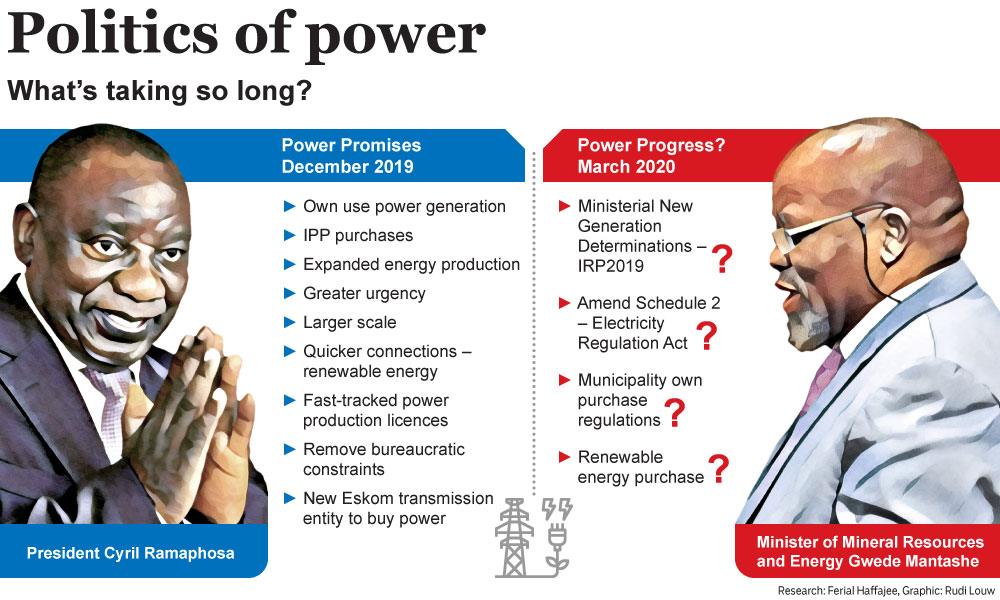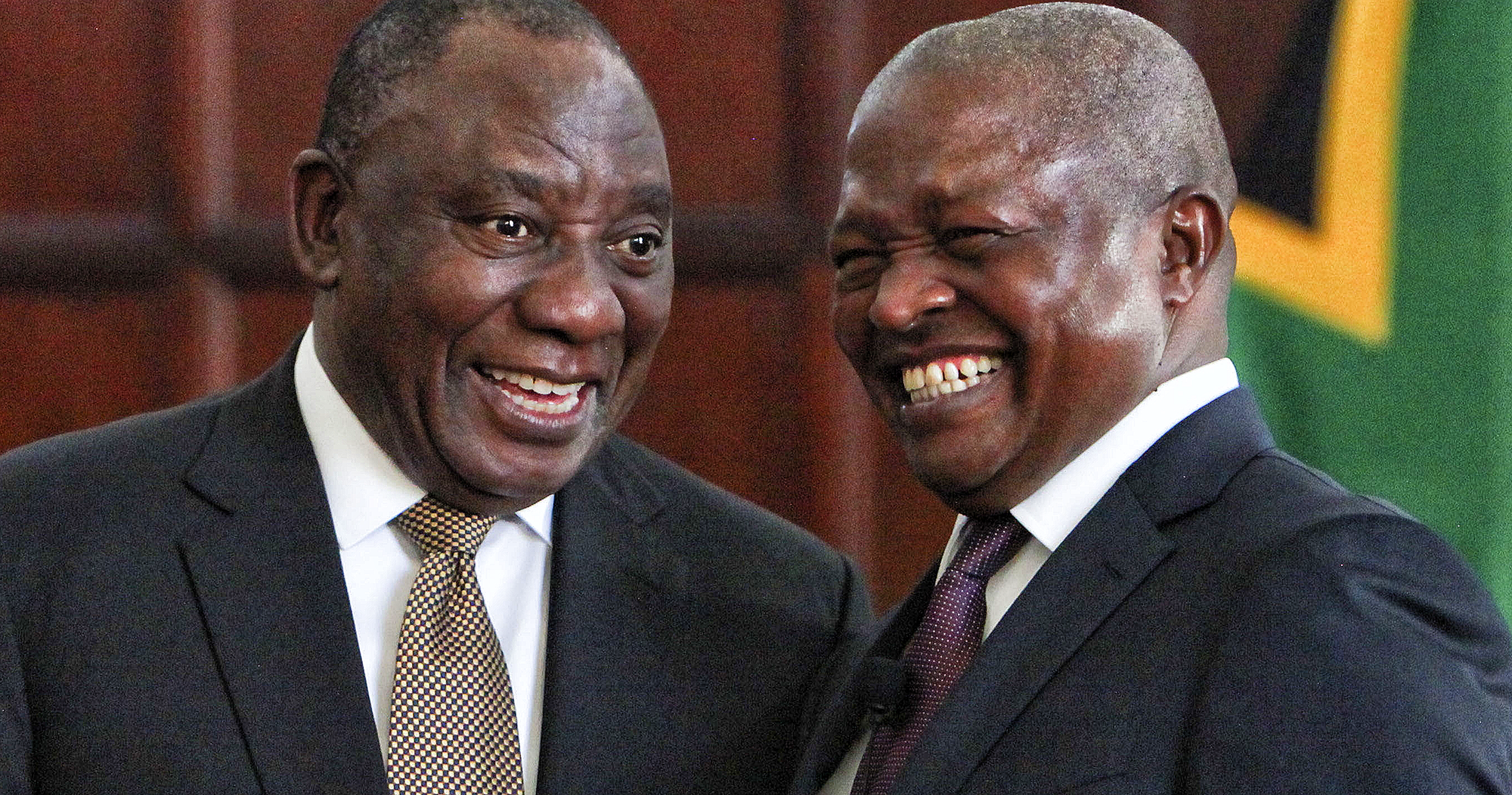As Stage 4 load shedding hit South Africa at the same time as Covid-19 – the disease caused by the novel coronavirus – and a market rout, a Cabinet divide on the energy path to follow has widened.
President Cyril Ramaphosa’s December plan (A new era in energy generation Cyril Ramaphosa 18 DEC) outlined in Daily Maverick is now more than 100 days old and no emergency power has been procured as he promised when South Africa was hit by a festive season of power cuts up to Stage 6. And neither the executive, nor the regulator, are close to amending laws to allow self-generation by companies that have a capacity of 5 GW ready but who are being held ransom by load shedding that has pushed the economy into recession.

The Cabinet is now clearly divided into two camps on the energy crisis.
On the one side are Ramaphosa and Finance Minister Tito Mboweni, who want a distributed model of energy generation and transmission (and even a “green energy revolution” as the president pledged in February 2018).
On the other side is Deputy President David Mabuza, who last week said in Parliament that independent power producers (IPPs) are not and will not be significant contributors to the national grid. He is aligned with Energy Minister Gwede Mantashe, who told Parliament in February that he had made progress on the issue of independent power producers.
This progress was: to lift the stringent limits on self-generation (currently 1MW) by companies with capacity; to open the fifth window for renewable energy bidders, and that his team had sifted through the more than 400 expressions of interest he received after issuing the request for information on emergency power (defined as capacity to generate and sell to Eskom’s grid in three to six months).
In fact, nothing tangible has happened and Mantashe’s team keep putting process issues into the public domain instead of material progress.
And, according to the National Energy Regulator of SA (Nersa) timetable, it could be months before the law is amended to lift South Africa’s energy availability factor (EAF).
Electricity (or the lack thereof) is driving the already limited growth prospects into the ground and Eskom CEO André de Ruyter last week told Parliament that Stage 8 load shedding is a real possibility unless he gets the support and space he needs to institute a proper maintenance schedule on the creaking fleet of coal-fired power stations that still power South Africa.
Is Ramaphosa facing sabotage or intractable bureaucracy – the slow state – and red tape at the regulator?
Mabuza goes anti on independent power plans
Last week, Mabuza, who is the chairperson of the energy war room, set out an energy plan that has its back to the future: he is highly sceptical of the ability of IPPs to make a difference and supports a near-complete state model.
“Independent power producers... these are individuals that are supplying 5MW, two there, 10 there... it’s not significant. There’s not even a single independent producer that is producing 500MW, all of them are less than 100, some are less than 50MW. Whether they are there or not, it wouldn’t make any difference.”
The statement is not true.
Independent producers do produce much more and can ramp up if the conditions are created for them to do so. But Mabuza is now aligned with a growing and powerful front that is using IPPs, generally, and renewable energy independent power producers (REIPPs) specifically, as evidence of an alleged privatisation scheme by Ramaphosa.
This front is harnessed by the SA Energy Forum (SAEF), a group with links to the Russian nuclear agency Rosatom, and it now includes the EFF (whose leaders with followings in the millions of members enthusiastically tweeted Mabuza’s scepticism). Also in the energy fightback front is the APC, the party of former MP Themba Godi. It became aligned with the fightback camp after he did not make it back to Parliament where he had been a highly regarded chairperson of Scopa, the public accounts committee.
Adil Nchabeleng, the charismatic nuclear lobbyist, is the most visible of the SAEF members and he and other founders of the forum all now belong to the APC. Nchabeleng is a political entrepreneur who also heads Transform RSA, one of a plethora of organisations which push against a distributed energy model, in general, and specifically against renewable energy.
The front is growing as patronage networks are weeded out at Eskom and procurement systems are streamlined. It now includes the Coal Transporters Forum, a network of truckers who made fortunes on transporting coal from non-tied mines*.
Nchabeleng and others in the new front are influential in the ANC. Multiple sources have told Daily Maverick that Nchabeleng and the SAEF have the ear of Enoch Godongwana, the chairperson of the ANC’s powerful economic transformation committee and also the chairperson of the DBSA.
Green is not black
The lobby operates on the easy slogan that green energy is not black enough and that nuclear and clean coal are the black options for energy market participation by the black business.
Any move toward liberalisation of the energy market or a least-cost route to build a new energy grid is racialised. It is spun as an attempt by a new version of “white monopoly capital” (this time, the largely European renewables producers who won the first four bid rounds for wind and solar energy contracts with Eskom) to edge out black players who had just started to make money in coal and, potentially, in nuclear.
Like most race narratives in South Africa, it falls on listening ears and, apparently, on powerful ears. In a report to the International Energy Agency (IEA) for its annual coal report, it is clear that the Department of Mineral Resources and Energy still sees a big role for the black gold in South Africa’s energy future. This is despite the fact that a growing number of banks will no longer fund coal exploration or mining or production of any fossil fuels.
The report also reveals that the department has failed its own start date on IPP emergency procurement which could have staved off Stage 4 load shedding.
One of the slides presented at the IEA says:
“Discussion has commenced with the Independent Power Producers to establish which of the Bid Window 4 projects (renewable energy) originally scheduled to come on stream in 2023, can be brought on stream from February 2020.”
But February 2020 has come and gone, revealing a lack of political will and bureaucratic competence.
The international report then makes it clear that South Africa is not planning a rapid just transition away from coal to clean energy forms. Another slide says: “South Africa has reduced its reliance on coal for generating electricity from over 90% to just over 75% over the past few years,” but it then goes on to state how vital coal still is to the country and its economy.
Where does Gwede Mantashe stand?
Mantashe is a coal man. A former mineworkers’ leader of the National Union of Mineworkers, which still organises coal miners, it is his natural and most powerful constituency. He has said he won’t be pushed or rushed into opening a new bid window for renewable energy producers and that he has done all he can to pass the determinations in terms of the Electricity Regulation Act to amend how quickly Eskom can procure independently produced electricity.
Daily Maverick requested an interview with Mantashe but his team said his speech to Parliament in February covered his bases. “It’s all we’re saying for now,” said spokesperson Thandiwe Maimane in a WhatsApp message.
The speech Mantashe delivered in Parliament on February 18 contained much hot air and many big words.
“However, intermittent supply deficiency problems persist,” said Mantashe – in other words, economy-destroying power cuts. “Section 34 determinations to implement the IRP (Integrated Resource Plan) 2019 are finalised and await concurrence by Nersa. This will enable opening of bid windows for the renewable energy power procurement,” said Mantashe without giving timelines. He said licensing for own generation had been eased. But business says it has not.
To which Mantashe replied: “Most of them [the applications] are incomplete because they lack power purchase agreements, which is a requirement to show who the consumer of the power is.” It continued in this vein.
Slow train at Nersa
Over at Nersa, the energy regulator, there was even less verve on the same day (Tuesday, 10 March 2020) that Eskom accelerated load shedding from Stage 2 to Stage 4 in a matter of hours.
“There is no time period in the Electricity Regulation Act for the processing of the request for concurrence [to allow emergency power procurement],” said spokesperson Charles Hlebela. He said that affected parties need to be given time to comment.
It will take Nersa four months to process licence applications for own production above one megawatt – a step that business says will ease the pressures it faces when load shedding harms production and productivity.
South Africa may not have four months, as a Moody’s downgrade to junk status is imminent, Daily Maverick pointed out to Hlebela. “The time frame is under consideration and will be communicated within days,” he said.
Power play
Energy has become a political power play with Ramaphosa and Mboweni the doves who know that the only energy future is a least-cost model in which renewable energy becomes the market leader.
All the geopolitical signs are there that climate justice is an enabler for developing countries with lots of sun, wind and the potential of gas also being fed into the grid or generated and transmitted independently.
On the other side of the spectrum are the energy hawks, who now include Mantashe and Mabuza. While they are not publicly pro-nuclear, many of their influential consorts are and Mantashe is Old King Coal. In ANC politics, the duo of Mantashe and Mabuza are more powerful than Ramaphosa and Mboweni.
They have bigger constituencies and offer the lure of short-term black power over long-term green power. DM
This article is more than 5 years old
Business Maverick
Stage 4 load shedding hits as Cabinet divide on energy deepens
Is energy the arena of the next phase of State Capture or of a political fightback that has frustrated President Cyril Ramaphosa’s plans for emergency power generation and a self-proclaimed green energy revolution?

Update - For the record: The Black Energy Professionals Association is not part of the energy front, as first identified in this article. We have consequently removed its name and apologise for including it. The BEPA is a group of non-partisan and energy source agnostic professionals.




